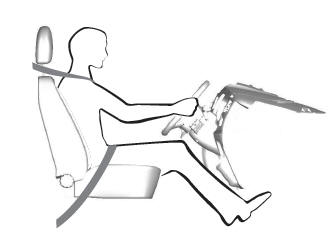Ford Escape: Airbags / How Do the Front Airbags Work

The driver and front passenger airbags deploy during significant frontal and near frontal crashes.
The driver and passenger front airbag system consists of:
- Driver and passenger airbag modules.
- Front passenger sensing system.
- Crash sensors and monitoring system with readiness indicator.
The airbags are a supplemental restraint system and are designed to work with the seatbelts to help protect the driver and right front passenger from certain upper body injuries. Airbags do not inflate slowly; there is a risk of injury from a deploying airbag.
Note: You will hear a loud bang and see a cloud of harmless powdery residue if an airbag deploys. This is normal.
The airbags inflate and deflate rapidly upon activation. After airbag deployment, it is normal to notice a smoke-like, powdery residue or smell the burnt propellant. This may consist of cornstarch, talcum powder (to lubricate the bag) or sodium compounds (for example, baking soda) that result from the combustion process that inflates the airbag. Small amounts of sodium hydroxide may be present which may irritate the skin and eyes, but none of the residue is toxic.
Contact with a deploying airbag may cause abrasions or swelling. Temporary hearing loss is also a possibility as a result of the noise associated with a deploying airbag.
Because airbags must inflate rapidly and with considerable force, there is the risk of death or serious injuries such as fractures, facial and eye injuries or internal injuries, particularly to occupants who are not properly restrained or are otherwise out of position at the time of airbag deployment. Thus, it is extremely important that occupants be properly restrained as far away from the airbag module as possible while maintaining vehicle control.
Routine maintenance of the airbags is not required.
 Airbags
Airbags
..
 How Do the Side Airbags Work
How Do the Side Airbags Work
WARNING: Do not place objects
or mount equipment on or near the
airbag cover, on the side of the front or
rear seatbacks, or in areas that may
come into contact with a deploying
airbag...
Other information:
Ford Escape 2020-2025 Service Manual: Removal and Installation - Light Sensor
Special Tool(s) / General Equipment Interior Trim Remover Removal NOTE: Removal steps in this procedure may contain installation details. Using a non-marring tool release and position the light sensor. Use the General Equipment: Interior Trim Remover Disconnect the electrical connector and remove the light sensor...
Ford Escape 2020-2025 Service Manual: Assembly - Transmission
Special Tool(s) / General Equipment 204-029Drawbar 205-153 (T80T-4000-W) Handle 307-541Installer, Transfer Gear BearingTKIT-2005D1-F 307-591Shim Gauge, Differential/Transfer Gear BearingTKIT-2006UF-FLMTKIT-2006UF-ROW 307-672Installer, Input Guide and SealTKIT-2010D-FLMTKIT-2010D-ROW 307-680Table, Assembly (DPS6)TKIT-2010D-FLMTKIT-2010D-ROW 307-741..
Categories
- Manuals Home
- 4th Generation Ford Escape Owners Manual
- 4th Generation Ford Escape Service Manual
- General Procedures - Brake Service Mode Activation and Deactivation
- Fuel Quality
- Accessing the Trip Computer. Resetting the Trip Computer
- New on site
- Most important about car
Sitting in the Correct Position

When you use them properly, the seat, head restraint, seatbelt and airbags will provide optimum protection in the event of a crash.
